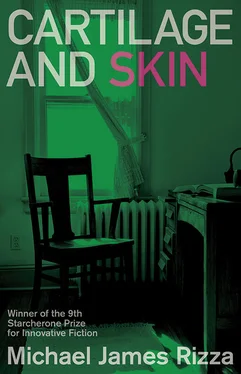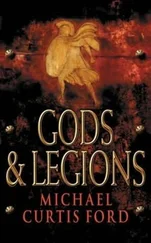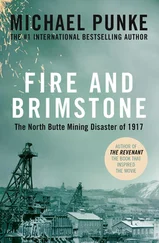The second week of autumn brought with it a spell of dismal weather that had apparently chased Claudia indoors. A gray drizzle seemed to be in a constant state of fading, of tapering into a mist, but after a few days of these vague diminutions, the gloomy weather didn’t seem as if it would ever break. I set myself before the window and watched the alley. As puddles formed, the oil and grime rose off the pavement to the surface of the water in twisted hues of purple and yellow and green. A few stray clothespins hung from the line, and the milkcrate was turned over on its side against the wall. I had a book, written by one of my colleagues, opened facedown upon my thigh. She was a short, intense, over-wound woman, whose voice — when I was forced to hear it in an elevator, hallway, or meeting — always metamorphosed in my mind into the violent yappings of a small dog. I was reading her book because of an unwritten rule among the faculty: We all read each other’s work, not so much to honor the writer or ever really to mention the text in detail, but simply to consume the person. I tried to play my part in this sober, pedantic game. Now, however, as I watched the alley, I had trouble concentrating; I couldn’t sink my teeth into the puppy. I was half-expecting to see the boy trot up to my window in his little cut-off shorts and a flimsy tee-shirt. I was also half-waiting for Claudia Jones, though I knew I’d do better stationed in the hallway outside her door. If there was something self-defeating and repressive in my method, I didn’t realize it at the time, for I imagined myself sitting there with the patience of a baited trap. Sometime during the second day, I decided to read only the first and last paragraph of each chapter of the book. Everything I read, however, sat so disconnected in my mind that I finally found myself reading the introduction, hoping this would join together the jumble of ideas. The city outside seemed moribund, as if the air were contaminated and everyone were diseased and quarantined. It wasn’t so much the gray weather or my sporadic sleeping, as it was my low, gray shiftless mood that seemed to blend the boundaries of day and night, so I didn’t know exactly at what moments I picked up the book or put it down, but eventually I came upon a moment when I opened the book and discovered that there were no more pages left to read. This act of completion roused me a little, making me realize that although all the world appeared to be overcast by a desultory haze, I alone was suspended. Elsewhere, life was being lived: Plans were enacted, lusts consummated, and bodies splayed on both sheets and spikes. Perhaps, right at that very moment, W. McTeal was on all fours, still baffled, and looking past his thigh at a propped camera; meanwhile, on a stark corner cot in a white ward, the boy was trying to gnaw through his restraints (this was how I always imagined him for some reason); quiet and faceless, in a damp, windowless chamber in a cellar, in the gloom of a single light bulb dangling from a wire, the social worker was selecting her leatherwear and whip; and perhaps somewhere in West Virginia, a young, goofy-looking man was furtively leading his favorite goat behind the barn and unwittingly preparing himself to usher in the Apocalypse, by siring Satan. Although it was difficult for me to imagine that terrible cosmic drama, in which the human race was not only the prize but also the playing field, I felt a small prompting in my heart, and whether for the light or for the darkness, I abandoned my post at the window and stood in the middle of the room. I slowly turned my head, my eyes passing over everything, as if all the objects that surrounded me, which in fact defined me, from the bookshelves to the microwave, belonged to no one, least of all to me. The clock read 1:14, sometime in the afternoon or the night. In this drunken, fog-bound mood, I left my apartment and entered the hallway. I had a vague notion of walking up to Claudia’s door and rapping hard upon it. After all, despite her idiocy, she must have known that I existed, because who else had been sliding her mail under her door? I stood before her apartment and tried to peer in the peephole, but I merely saw the reflection of my own eye. I leaned back for a second and then, by impulse, rapped two times, hard, with the butt of my palm, just as I had seen my landlord do on the day I’d first moved into my apartment. I looked at my eye again in the little circle, and as I stared at my eye, I sensed that the tiny window was the only thing separating me from Claudia Jones, we were eye to eye, and both of us were looking at the same thing: my eye. I was thrilled by the proximity, by my boldness, and of course, by the sudden realization — not that I was on the threshold of making an absurd gesture — but that never once did I ever see the bloated woman in the hallway; I had no reason to assume that the woman in the alley was in fact my neighbor Claudia Jones. This new idea nearly prompted me to scramble away from the door like a startled rodent. Yet my world suddenly seemed larger than I’d originally imagined; I had more prospects than the alley-woman and Tess. I had the unknown, and maybe she was waiting for me behind some closed door, in an art gallery, or in a used clothing store. Somewhere in the city. Leaning against the door, still trying to stare through my own reflection, I hoped that the real Claudia Jones would be a new discovery. If she were “a gross woman,” and not actually an imbecile, I was curious about what kind of disfigurement plagued her body or marred her soul. Knowing my landlord, I safely guessed that he simply meant that she was a dissolute creature.
Then I heard a noise: A body moved on the other side of the door as the floorboards creaked. I didn’t pull away or look up and down the hallway. We waited in silence for a long a time, until I was able to make out the muffled sound of her breathing, and I knew for certain that she was there, inches away from me. I began to wonder why she didn’t respond to my knock. Perhaps she’d looked through her peephole and had seen only my eyeball, and she was afraid. I took a step back and knocked again, softly this time. Off to my left, someone entered the building and started up the staircase, but I didn’t turn to see who it was. Trapped in the moment, I faced the door and smiled vaguely.
“Just slip them under.” The real Claudia had spoken at last. Her voice was thick, as though she had a wad of phlegm at the back of her throat.
“I’m your neighbor,” I said. “I thought it would be nice—”
“Just slip them under.”
“—it would be nice to say hi.”
“What do you want?”
“I thought it would nice.”
Silence filled the pause.
“Oh now,” she said, and I heard her stepping back. “Fuck it to hell. Keep them all.” Her voiced lowered, as if she were speaking to herself.
“If you want to say hi sometime, I’m right down the hall.” I tried to sound pleasant. I imagined that if she opened the door and gave me the chance, I could have been mildly charming.
She didn’t say anything else. The floorboards creaked; she was walking away.
I waited for a few seconds, hoping she would come back, then thinking that I should knock again. I didn’t quite realize at the moment that standing before her door, at some odd hour, in a white tee-shirt and a pair of shorts, was a lanky, disheveled man who hadn’t showered, shaved, or even brushed his teeth in several days. I was too obsessed with the situation to see myself clearly. I started back toward my apartment. As far she knew, I still had her mail. At first, she’d figured that I’d come to return it, but then she’d suspected that I intended to use W. McTeal to draw her out of her apartment. This fact seemed so obvious that I supposed that she saw through me: I — like all other men and pubescent boys — was an individual with a dimly concealed ulterior motive. And what was wrong with this? Pleased with myself, though somewhat blank and benumbed, I returned to my apartment, burrowed beneath my blankets, and slept the kind of sleep that could have been minutes or days long.
Читать дальше












